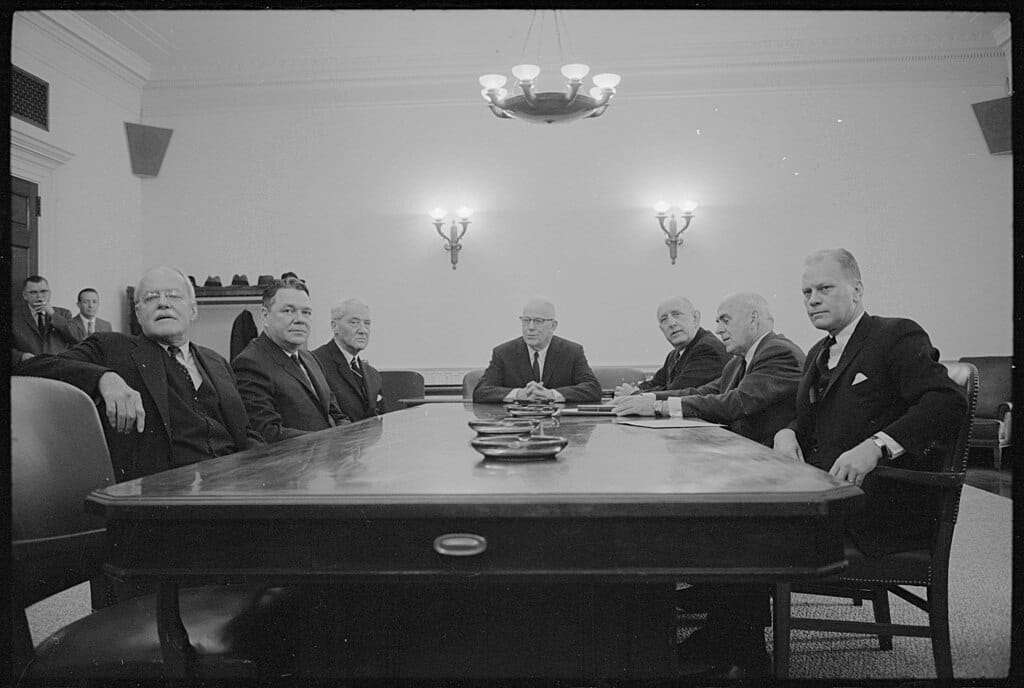deep state

A deep state is an entrenched, shadowy cabal of government bureaucrats and military officers who manipulate and control government policy to resist reform and measures that would reduce their power. In some political systems the deep state is a reality; in others it is more a paranoid conspiracy theory. The phrase is a calque, or loan-translation, of the Turkish derin devlet.
The earliest use of the English calque that I’m aware of is cited by the Oxford English Dictionary, from the 9 May 1997 issue of the periodical Turkish Probe:
Remnants of this extralegal paramilitary organization have been instrumental in the mafiozation trend in parts of the “deep state” as the national security emphasis shifted away from anti-communism and the Russian threat.
And on 26 September 1997 the phrase appears in the New York Times in an article about a Turkish lawyer who was sentenced to prison for making a speech in support of Kurdish separatism:
The coincidence of these three decisions caused much comment in political circles and the press, where the existence of a “deep state,” a set of obscure forces that seem to function beyond the reach of law, has become a major topic of discussion over the last year.
In the years that follow, deep state was applied in the context of countries other than Turkey, especially authoritarian regimes in the Middle East.
The earliest use of deep state in reference to the United States that I’m aware of is in Peter Dale Scott’s 2007 book The Road to 9/11: Wealth, Empire, and the Future of America:
But there is another problem affecting the United States: our supposed open society is in fact partly driven by deeper forces many of us do not clearly see, especially in matters of foreign policy. This weakness of civil society at the federal level allows policy to be dictated by special interests. This is particularly true of foreign policy, more and more of which is driven by covert bureaucracies in the Central Intelligence Agency (CIA) and the Pentagon, uncontrolled by the checks and balances of the public state. In this book I designate as the “deep state” (a term borrowed from Turkish analysts) that part of the state driven by top-down policy making, often by small cabals.
Scott, a noted Canadian diplomat, poet, and academic, uses the term in the context of a serious political analysis, arguing that entrenched special interests can thwart popular, democratic agendas, an argument that one can hardly dispute. But once the CIA and intelligence agencies are invoked, one can see how the argument was taken up conspiracy theorists and politicians who would use conspiracy theories to create popular appeals.
And by 2016, deep state was in use in an American context with just such a conspiracy-minded context. A piece in the 8–9 October issue of the Financial Times about film director Oliver Stone uses the phrase without explanation in just such a context:
If [Oliver] Stone resembles any American artist of this generation, it is Don DeLillo, “chief shaman of the paranoid school of American fiction,” as the NYRB once had him. Both men paint a country that was nearing its 200th year of innocence when the Kennedy assassination acquainted a simple people with the darker edges of life. Ever since, their work implies, the idea of America has been sullied by enemies within: the deep state, rampant markets, God-like technology.
A few months later, on 22 January 2017, two days after Donald Trump’s first inauguration as US president, London’s Sunday Times ran a piece in which another Stone, this time Trump consigliere Roger Stone, casts the newly inaugurated president as the enemy of the American “deep state”:
After a recent brush with illness, [Roger] Stone says he is convinced CIA operatives and parts of the intelligence establishment are out to get him—and by extension, Trump. He claims his doctor told him that he was poisoned with a radioactive substance such as polonium.
Stone believes that “the deep state” (American intelligence) is threatened by Trump, fearing the big changes he could force through.
So at least in the American context, deep state is what grammarian Bryan Garner calls a “skunked” term. What was once a useful term in political analysis has become a phrase that cannot be uttered by serious people without explanation and disclaimers because of its association with conspiracy theories and the corrupt politicians who use it to manipulate the public.
Sources:
Ganesh, Janan. “I Was Always Concerned About Lies.” Financial Times (London), 8–9 October 2016, 3/4–5. Gale Primary Sources: Financial Times Historical Archive.
Harnden, Toby. “The Donald Did It My Way.” Sunday Times (London), 22 January 2017, 16/6. Gale Primary Sources: Sunday Times Historical Archive.
Kinzer, Stephen. “Blind Turk Is Going to Jail to Find Freedom, He Says.” New York Times, 26 September 1997, A6. ProQuest Historical Newspapers.
Oxford English Dictionary, third edition, March 2023, s.v. deep state, n.
Scott, Peter Dale. The Road to 9/11: Wealth, Empire, and the Future of America. Berkeley: University of California Press, 2007, xvi. JSTOR.
Photo Credit: Warren K. Leffler, 1963. Library of Congress. Public domain photo.